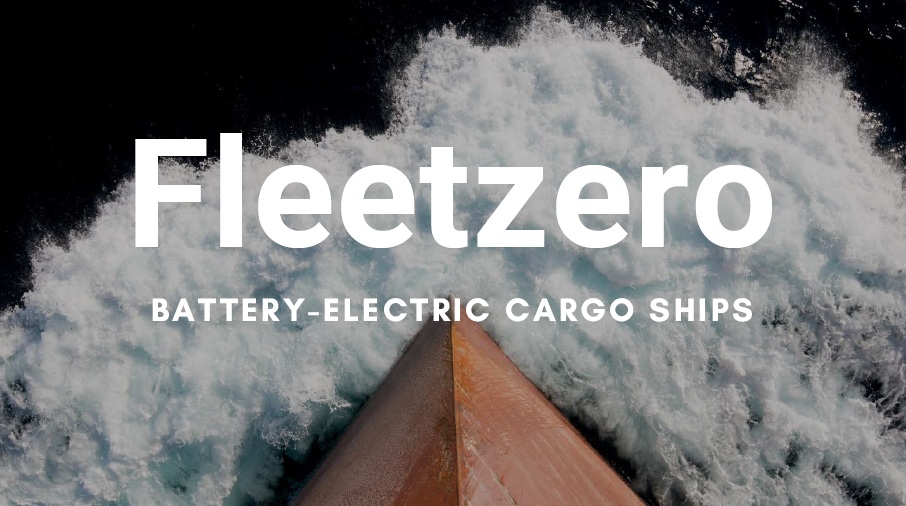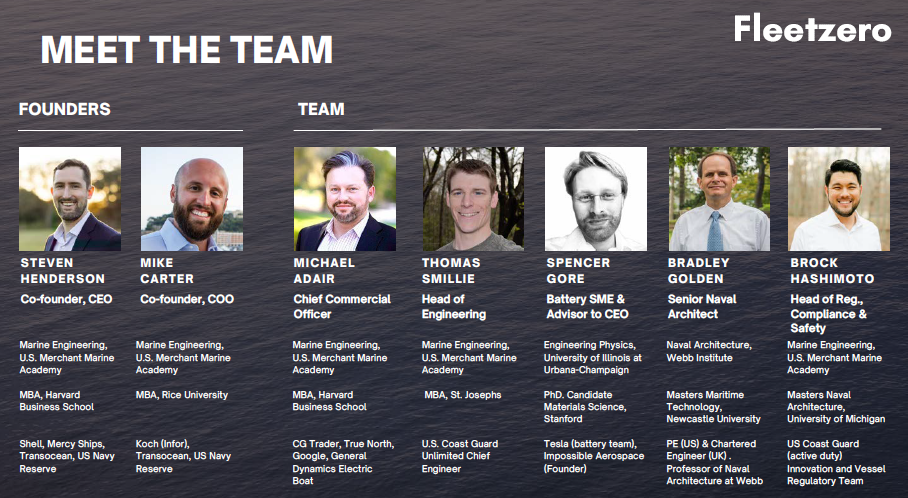Fleetzero
Our Investment in Fleetzero
You might undertake the majority of your long-distance travel by plane, but most of the goods that may accompany you — your luggage, clothing, noise-cancelling headphones, and laptop — did not take their maiden voyage by air. Instead, they and 90% of all traded-goods worldwide are transported over the sea in cargo ships. This has become clearer in recent months, as logjams at ports across North America have caused delays in deliveries of all kinds of goods: from appliances to vehicles to bicycles and clothing.
Heavily relied upon by the global economy, ocean shipping has a significant carbon footprint. It generates 3% of all carbon emissions worldwide, a figure that is higher than even the aviation sector. Nearly all modern cargo ships are powered by fossil fuels and, when compared with ground transportation, ocean shipping remains a stubbornly difficult sector to decarbonize. Given the number of batteries required to power a cargo ship for a transoceanic journey, the challenge of electrifying these vessels stems from the fact that the sheer weight is prohibitive. Hydrogen, a fuel in use in a small number of ships and eyed by some as the future of heavy transport, has its own challenges related to storing the volatile gas. Hydrogen storage requires pressurization or intense cold to keep it as a liquid. This factor has raised concerns as to whether it’s an economic option. Similarly, ammonia is being explored as another alternative; however, its toxicity presents safety issues and presents challenges as a combustible fuel. Both hydrogen and ammonia will require massive buildouts of infrastructure to become viable.
Addressing the emissions impact and the cost of seabound logistics, Fleetzero is working to decarbonize cargo shipping by developing a fleet of smaller, more efficient, electric-powered ships that run on an innovative battery-swapping system. En route to their destination, Fleetzero ships dock at ports along their journey, unloading depleted lithium batteries and replenishing themselves with a fully-charged complement of new ones. Stored and assembled in transportable containers, batteries are shared across the fleet and allow for shorter stays at port than would be the case if each ship were recharged while at the dock. Along with shorter port-stays, battery swapping and sharing offers the economic benefit of reduced costs as a result of requiring fewer batteries per ship. We’re excited to announce our investment in Fleetzero — a part of the Y Combinator W22 cohort and founded by an amazing team of marine engineers, materials scientists and naval architects — as it pursues a bold new solution to decarbonize the massively vital oceanic cargo sector.
What is Fleetzero?
Fleetzero’s containerized battery packs are the same size as a standard 20-foot cargo container, allowing Fleetzero to utilize existing port infrastructure for its battery swap program.
Fleetzero offers the shipping industry a pathway to decarbonization through an innovative business model that lowers costs compared with current diesel or oil-powered shipping. The incumbent shipping model incentivizes building the largest ship possible to achieve economies of scale – this is problematic given the emissions output of these enormous vessels. Also, the vast size of these ships limits their options to docking at large ports. In contrast, smaller ships allow for access to many more ports, delivering goods closer to their final destination. As a result of this logistical efficiency, Fleetzero offers the opportunity to deliver goods faster and more cheaply than existing providers. Moreover, because the electrified propulsion systems are mechanically simpler, the operating expenditures of maintaining electric-powered fleets is prospectively lower compared with fossil-fuel driven ships. By removing fuel and ballast water tanks, more space is freed up for cargo which further optimizes for efficiency and cost.
Fleetzero’s electric-powered design also delivers a subtle but important environmental benefit. Due to the consistent weight of the battery systems on each ship, Fleetzero vessels will not need to take on the seawater ballast that conventional ships require as they deplete their liquid fuel over the course of the voyage. This practice is notorious for causing the proliferation of invasive non-native aquatic species in foreign ecosystems.
By designing rugged battery systems encapsulated in a standard 20-foot cargo container, Fleetzero is able to leverage the existing infrastructure common at ports to swap out batteries to fuel the next leg of a ship’s journey. The offloaded battery is then charged for the next Fleetzero ship to come through. This battery swap system allows a Fleetzero ship to travel with a fraction as many containerized batteries as it would need to make a single continuous journey to a destination port. This results in the benefit of reducing battery costs per ton of cargo.
Fleetzero has built a prototype containerized battery at its Alabama facility and is currently seeking regulatory approval of its battery pack design. It is aiming to launch the maiden voyage of its first electric vessel in mid-2023, carrying cargo for its pilot partners.
Why did we invest?
Compelling Founder-Market Fit
Founders Steven Henderson and Mike Carter bring with them a deep background in the marine world and expertise in ocean propulsion, project management and operations, as well as business experience in energy and shipping. The founding team has plenty of experience on the water as well, having worked aboard ships for the U.S. Merchant Marine, U.S. Navy, and Coast Guard. Both founding partners, as well as the rest of the Fleetzero team, offer a compelling mix of engineering, naval architecture, materials science, and commercialization experience. We believe that Fleetzero is well-equipped to execute on its vision of zero-carbon shipping.
More Than Just Decarbonization
While its core innovation of swappable batteries offers a significant climate benefit, Fleetzero has designed a logistics solution that is competitive with existing fossil-fuel providers on the basis of efficiency and cost. Combined, these value propositions position Fleetzero as not just the more environmentally-friendly alternative, but also the superior choice overall.
As battery costs continue to fall, Fleetzero will have an expanding strategic advantage compared with fossil fuel-powered fleets. Coupled with the growing recognition for the need to reduce emissions in the industry, the company is poised to be a leader in carbon-neutral ocean logistics.t Energetic is well-positioned to expand on its value proposition, paving the way for more commercial and industrial facilities transitioning to clean renewable solar energy.



